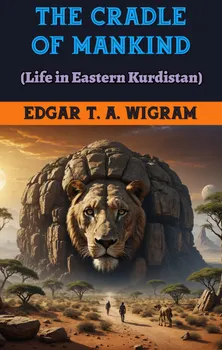FROM the eastern gate of Mardin the road decants itself plainwards in a skein of curves and zigzags—a vertical descent of 2000 feet, spinning out its gradients to a length of five or six miles.
It is not at all a bad road. One could easily bicycle down it—and perhaps even bicycle up it if in specially strenuous mood. But it is, as it were, the swan-song of the modern Ottoman Telfords, and as soon as it reaches the level it reverts into a sheaf of footpaths. Henceforth to the end of our journey we saw no more metalled roads.
We had now, too, a further reminder of the fact that we were quitting civilization, for a couple of zaptiehs rode with us to escort us over the stage to Nisibin. Hitherto such protection had been deemed needless: but in these remoter districts the Government prefers to have some tangible assurance of a European traveller’s safety, seeing that it is liable to be held responsible if he is unfortunate enough to come to grief.
Thus that modest intruder finds himself passed on from city to city with all the pomp and circumstance of an armed cavalry escort; and afflicted at every stage with the consciousness that he is passing current at a face value vastly in excess of his intrinsic worth.
The zaptiehs are a sort of military police, analogous to the Spanish Civil Guard or the Royal Irish Constabulary; though we fear that these two corps d’elite would not be likely to feel gratified at a suggestion that such deplorable ragamuffins should “march through Coventry” with them. Personally, for the most part, they are good-humoured and obliging fellows; accepting rough weather and hard lodging with the utmost philosophy. Also they rather welcome the chance of a little escort duty. It is a pleasant change from the monotony of garrison life; and there is a tip to look forward to finally, though this must be “under the rose.” “You have not mentioned that you’ve given us a present?” said one of our fellows with engaging naïveté when we asked him to carry back a letter—“Because it isn’t allowed!”
But though Western civilization extends thus far no longer, there is not wanting tangible evidence to prove that it was here long ago. In the midst of one of the first plain villages there rises, like a lofty aiguille, the angle of a Roman watch tower. It seems impossible that such a slender fragment should be able to withstand wind and weather much longer; but hitherto the huge square blocks have stood firm though all support has fallen away. A Roman church (or more probably a Roman house converted into a church) stands in another village; and at the end of a short day’s journey we turned aside to visit some yet more striking remains.
The mountains at this point ravel out on to the plain in a line of gently sloping spurs, and from between two of these issues a broad and shallow but never-failing stream. The spurs immediately westward of it are conspicuously gashed across with wide deep transverse trenches; and as we draw nearer we perceive that the ridge on each side of the river is crested with a ruined rampart, and that the hollow enclosed between them is a regular sugar bowl of huge disjointed stones. Here and there out of the chaos rises the fragment of a mighty tower or a massive skeleton archway, and presently we can descry a few wretched Kurdish hovels half hidden among the débris of the great devastated city.
